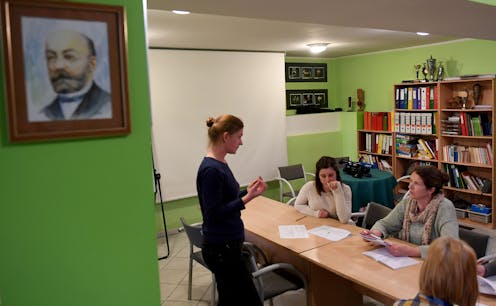A brief history of Esperanto, the 135-year-old language of peace hated by Hitler and Stalin alike
- Written by Joshua Holzer, Assistant Professor of Political Science, Westminster College

In the late 1800s, the city of Białystok – which was once Polish, then Prussian, then Russian, and is today again part of Poland[1] – was a hub of diversity, with large numbers of Poles, Germans, Russians[2] and Yiddish[3]-speaking Ashkanazi Jews[4]. Each group spoke a different language[5] and viewed members of the other communities with suspicion.
For years, L.L. Zamenhof[6] – a Jewish man[7] from Białystok who had trained as a doctor in Moscow – had dreamed[8] of a way for diverse groups of people to communicate easily and peacefully.
On July 26, 1887[9], he published what is now referred to as “Unua Libro[10],” or “First Book,” which introduced and described Esperanto[11], a language he had spent years designing[12] in hopes of promoting peace among the people of the world[13].
Esperanto’s vocabulary[14] is mostly drawn from English, French, German, Greek, Italian, Latin, Polish, Russian and Yiddish, as these were the languages that Zamenhof was most familiar with[15]. Grammatically, Esperanto was primarily influenced[16] by European[17] languages, but interestingly[18], some of Esperanto’s innovations bear a striking resemblance to features found in some Asian languages[19], such as Chinese[20].
Now, 135 years later, Europe is again riven by violence and tension, most notably by the war between Russia and Ukraine, which is at least partially driven[21] by a political debate about language differences[22]. Unfortunately, conflicts over language are common[23] around the world.
The promise of peace through a shared language has not yet caught on widely, but there are perhaps as many as 2 million Esperanto speakers worldwide[24]. And it’s still spreading, if slowly.
Families gather from around the world to speak Esperanto.A language for all
Having grown up in the multicultural but distrusting environment of Białystok[25], Zamenhof dedicated his life to constructing[26] a language that he hoped could help foster harmony between groups[27]. The goal wasn’t to replace anyone’s first language[28]. Rather, Esperanto would serve as a universal second language[29] that would help promote international understanding – and hopefully peace.
Esperanto is easy to learn[30]. Nouns do not have grammatical gender[31], so you never have to wonder whether a table is masculine or feminine. There are no irregular[32] verbs, so you don’t have to memorize complex conjugation tables[33]. Also, the spelling is entirely phonetic[34], so you’ll never be confused by silent letters or letters that make different sounds in different contexts.
In “Unua Libro,” Zamenhof outlined Esperanto’s 16 basic rules[35] and provided a dictionary. This book was translated into more than a dozen languages, and at the beginning of each edition, Zamenhof permanently renounced all personal rights to his creation[36] and declared Esperanto to be “the property of society.”
Soon, Esperanto spread[37] to Asia[38], North[39] and South[40] America, the Middle East[41] and Africa[42]. Starting in 1905, Esperanto speakers from around the world began gathering once a year to participate in the World Esperanto Congress[43] to celebrate – and use – the language.
Between 1907 and his death in 1917, Zamenhof received 14 nominations[44] for the Nobel Peace Prize, though he never won the award.
Continuing Zamenhof’s work, the Universal Esperanto Association[45], an organization that seeks to encourage relations among people through the use of Esperanto, has been nominated for the Nobel Peace Prize more than 100 times[46] in recognition of its “contribution to world peace by permitting people in different countries to enter direct relations without linguistic barriers[47].” So far, it has never won the award.
What is Esperanto, anyway, and what is it useful for?Struggles and successes
After World War I, the League of Nations[48] – the predecessor to the United Nations – was founded in hopes of preventing future conflict[49]. Shortly thereafter, the Iranian delegate[50] to the League of Nations proposed that Esperanto be adopted as the language of international relations.
However, this proposal was vetoed[51] by the French delegate, who feared that the French language would lose its position of prestige[52] in diplomacy. In 1922, the French government went a step further and banned the teaching of Esperanto at all French universities for supposedly being a tool to spread communistic propaganda[53].
Ironically, life behind the Iron Curtain[54] wasn’t much easier for Esperanto speakers. In the Soviet Union, Esperantists were alleged to be part of an “international espionage organization[55].” Many were persecuted and later perished[56] during Stalin’s Great Purge[57].
According to Hitler[58], Esperanto was evidence of a Jewish[59] plot to take over the world. During the Third Reich, the Gestapo received specific orders to search for the descendants of Zamenhof[60]. All three of his children[61] died in the Holocaust[62] – as did many Esperanto speakers[63].
Despite[64] such events, in 1954 the United Nations Educational, Scientific and Cultural Organization, better known as UNESCO[65], passed a resolution[66] recognizing – and entering into a relationship with – the Universal Esperanto Association, which opened the door for the Esperanto movement to be represented at UNESCO events pertaining to language[67].
In 1985, UNESCO passed a resolution encouraging countries to add Esperanto to their school curricula. For years[68], China[69] has offered Esperanto as a foreign language option at several of its universities, one of which houses an Esperanto museum[70]. There is now a program in interlinguistics[71] offered at Adam Mickiewicz University[72] in Poland that’s taught in Esperanto[73].
More recently, UNESCO declared 2017 as the year of Zamenhof[74], and since that time, its flagship journal – The UNESCO Courier[75] – has had an Esperanto-language edition[76] published quarterly.
In May 2022, there was an Esperanto group at the Amundsen-Scott South Pole Station in Antarctica.Give peace a chance
Today[77], Esperanto is spoken by pockets of enthusiasts[78] all around the world – including on Antarctica[79]. There is now a wide array of free Esperanto resources online[80], including Duolingo[81], lernu![82], the Complete Illustrated Dictionary of Esperanto[83], the Complete Manual of Esperanto Grammar[84] and Google Translate[85].
Esperanto also has its own edition of Wikipedia[86], and at present[87], there are more Wikipedia entries written in Esperanto than articles in Danish, Greek or Welsh.
Its founder, and many speakers, see Esperanto as a means toward achieving a more peaceful world.In Esperanto, the word “Esperanto” means “one who hopes.” Some may argue[88] that it is idealistic[89] to believe that Esperanto could unite humanity[90], especially in the midst of another major war[91].
But even the most violent wars don’t end without peace talks[92] – which often require translators[93] to interpret the languages of the opposing parties. Zamenhof wondered – and I do too – whether violence itself might be less common if a neutral language[94] could help people bridge their divides[95].
References
- ^ which was once Polish, then Prussian, then Russian, and is today again part of Poland (yivoencyclopedia.org)
- ^ large numbers of Poles, Germans, Russians (culture.pl)
- ^ Yiddish (www.yivo.org)
- ^ Ashkanazi Jews (theconversation.com)
- ^ different language (culture.pl)
- ^ L.L. Zamenhof (culture.pl)
- ^ Jewish man (www.nytimes.com)
- ^ dreamed (www.nytimes.com)
- ^ July 26, 1887 (time.com)
- ^ Unua Libro (www.genekeyes.com)
- ^ Esperanto (culture.pl)
- ^ designing (99percentinvisible.org)
- ^ promoting peace among the people of the world (www.theguardian.com)
- ^ vocabulary (libro.ee)
- ^ these were the languages that Zamenhof was most familiar with (www.babbel.com)
- ^ influenced (bulteno.esperanto-usa.org)
- ^ European (culture.pl)
- ^ interestingly (www.jbe-platform.com)
- ^ Asian languages (blogs.bl.uk)
- ^ Chinese (claudepiron.free.fr)
- ^ at least partially driven (theconversation.com)
- ^ a political debate about language differences (theconversation.com)
- ^ conflicts over language are common (theconversation.com)
- ^ 2 million Esperanto speakers worldwide (www.babbel.com)
- ^ Białystok (centrumzamenhofa.pl)
- ^ constructing (www.theverge.com)
- ^ he hoped could help foster harmony between groups (www.gutenberg.org)
- ^ wasn’t to replace anyone’s first language (www.mentalfloss.com)
- ^ a universal second language (freakonomics.com)
- ^ easy to learn (web.archive.org)
- ^ grammatical gender (blog.duolingo.com)
- ^ irregular (www.worldcat.org)
- ^ complex conjugation tables (www.bescherelle.com)
- ^ phonetic (www.dictionary.com)
- ^ 16 basic rules (babel.ucsc.edu)
- ^ Zamenhof permanently renounced all personal rights to his creation (www.esperantic.org)
- ^ spread (uea.org)
- ^ Asia (www.jei.or.jp)
- ^ North (ttt.esperanto-usa.org)
- ^ South (esperanto.org.br)
- ^ Middle East (news.bbc.co.uk)
- ^ Africa (www.esperanto-afriko.org)
- ^ World Esperanto Congress (esperanto2022.ca)
- ^ 14 nominations (www.nobelprize.org)
- ^ Universal Esperanto Association (uea.org)
- ^ more than 100 times (www.nobelprize.org)
- ^ contribution to world peace by permitting people in different countries to enter direct relations without linguistic barriers (www.nobelprize.org)
- ^ League of Nations (www.ungeneva.org)
- ^ in hopes of preventing future conflict (www.youtube.com)
- ^ Iranian delegate (en.umz.ac.ir)
- ^ vetoed (www.loc.gov)
- ^ position of prestige (www.nytimes.com)
- ^ tool to spread communistic propaganda (www.gastearsivi.com)
- ^ Iron Curtain (www.nationalchurchillmuseum.org)
- ^ international espionage organization (www.worldcat.org)
- ^ were persecuted and later perished (www.worldcat.org)
- ^ Great Purge (www.britannica.com)
- ^ According to Hitler (www.worldcat.org)
- ^ Jewish (www.yiddishbookcenter.org)
- ^ the Gestapo received specific orders to search for the descendants of Zamenhof (blogs.bl.uk)
- ^ children (blogs.bl.uk)
- ^ Holocaust (theconversation.com)
- ^ as did many Esperanto speakers (www.worldcat.org)
- ^ Despite (www.npr.org)
- ^ UNESCO (www.unesco.org)
- ^ resolution (unesdoc.unesco.org)
- ^ which opened the door for the Esperanto movement to be represented at UNESCO events pertaining to language (esperantoporun.org)
- ^ years (www.jstor.org)
- ^ China (bulteno.esperanto-usa.org)
- ^ Esperanto museum (e-muzeo.uzz.edu.cn)
- ^ interlinguistics (www.merriam-webster.com)
- ^ Adam Mickiewicz University (international.amu.edu.pl)
- ^ that’s taught in Esperanto (interl.home.amu.edu.pl)
- ^ the year of Zamenhof (diplomatmagazine.eu)
- ^ The UNESCO Courier (unesdoc.unesco.org)
- ^ Esperanto-language edition (uea.org)
- ^ Today (www.theguardian.com)
- ^ pockets of enthusiasts (www.meetup.com)
- ^ Antarctica (www.instagram.com)
- ^ online (www.ctpublic.org)
- ^ Duolingo (www.duolingo.com)
- ^ lernu! (lernu.net)
- ^ Complete Illustrated Dictionary of Esperanto (vortaro.net)
- ^ Complete Manual of Esperanto Grammar (bertilow.com)
- ^ Google Translate (translate.google.com)
- ^ Wikipedia (eo.wikipedia.org)
- ^ at present (en.wikipedia.org)
- ^ argue (www.economist.com)
- ^ idealistic (paw.princeton.edu)
- ^ unite humanity (www.newyorker.com)
- ^ another major war (theconversation.com)
- ^ peace talks (www.theguardian.com)
- ^ often require translators (doi.org)
- ^ neutral language (sites.law.wustl.edu)
- ^ bridge their divides (www.worldcat.org)
Authors: Joshua Holzer, Assistant Professor of Political Science, Westminster College





